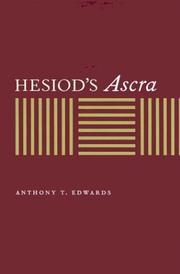| Listing 1 - 2 of 2 |
Sort by
|

ISBN: 0520929578 1597346519 9780520929579 1417520426 9781417520428 9780520236585 0520236580 9781597346511 Year: 2004 Publisher: Berkeley : University of California Press,
Abstract | Keywords | Export | Availability | Bookmark
 Loading...
Loading...Choose an application
- Reference Manager
- EndNote
- RefWorks (Direct export to RefWorks)
In Works and Days, one of the two long poems that have come down to us from Hesiod, the poet writes of farming, morality, and what seems to be a very nasty quarrel with his brother Perses over their inheritance. In this book, Anthony T. Edwards extracts from the poem a picture of the social structure of Ascra, the hamlet in northern Greece where Hesiod lived, most likely during the seventh century B.C.E.. Drawing on the evidence of trade, food storage, reciprocity, and the agricultural regime as Hesiod describes them in Works and Days, Edwards reveals Ascra as an autonomous village, outside the control of a polis, less stratified and integrated internally than what we observe even in Homer. In light of this reading, the conflict between Hesiod and Perses emerges as a dispute about the inviolability of the community's external boundary and the degree of interobligation among those within the village. Hesiod's Ascra directly counters the accepted view of Works and Days, which has Hesiod describing a peasant society subordinated to the economic and political control of an outside elite. Through his deft analysis, Edwards suggests a new understanding of both Works and Days and the social and economic organization of Hesiod's time and place.
Didactic poetry, Greek --- Farmers --- Poets, Greek --- Agriculture in literature. --- Farm life in literature. --- Villages in literature. --- Farm operators --- Operators, Farm --- Planters (Persons) --- Agriculturists --- Rural population --- History and criticism. --- Hesiod. --- Hesiod --- Gesiod --- Geziod --- Esiodo --- Hēsiodos --- Hezjod --- Hésiode --- Hesíodo --- Hesiyodos --- הסיודוס --- Ἡσίοδος --- Homes and haunts --- Knowledge --- Ascra (Greece) --- Voiōtia (Greece) --- Viotía (Greece) --- Voiotias Nomos (Greece) --- Boiotien (Greece) --- Béotie (Greece) --- Boeotia (Greece) --- Bioótia (Greece) --- Beotia (Greece) --- Boiotia (Greece) --- Intellectual life --- In literature. --- Agriculture in literature --- Farm life in literature --- Villages in literature --- History and criticism --- Hesiodus --- Intellectual life. --- Agriculture dans la littérature --- Vie à la ferme dans la littérature --- Ascra (Grèce) --- Dans la littérature --- agriculture. --- ancient greece. --- ancient history. --- aristocracy. --- boeotia. --- classical history. --- classicism. --- classics. --- community. --- cultural studies. --- days. --- debt. --- didactic poetry. --- family life. --- family structure. --- farmers. --- farming. --- greece. --- greek culture. --- greek democracy. --- greek poetry. --- hamlet. --- hellenism. --- hesiod. --- inheritance. --- literary criticism. --- literary. --- literature. --- morality. --- nonfiction. --- northern greece. --- peasants. --- perses. --- poems. --- poetry. --- poverty. --- property. --- rural. --- sacra. --- self. --- social history. --- village. --- wealth. --- works.
Book
ISBN: 9780691241944 Year: 2022 Publisher: Princeton, NJ
Abstract | Keywords | Export | Availability | Bookmark
 Loading...
Loading...Choose an application
- Reference Manager
- EndNote
- RefWorks (Direct export to RefWorks)
In a major revisionary approach to ancient Greek culture, Sarah Morris invokes as a paradigm the myths surrounding Daidalos to describe the profound influence of the Near East on Greece's artistic and literary origins.
Art, Greek. --- Arts --- Greek art --- Art, Aegean --- Classical antiquities --- Art, Greco-Bactrian --- History. --- Daedalus --- Δαίδαλος --- Daidalos --- Taitale --- Dédalo --- Dédale --- Acropolis. --- Aeschylus. --- Ancient Greece. --- Ancient Greek art. --- Ancient Greek comedy. --- Ancient Greek sculpture. --- Ancient Greek temple. --- Anecdote. --- Archaeology. --- Archaic Greece. --- Athenian Democracy. --- Barbarian. --- Baruch Spinoza. --- Battle of Salamis. --- Classical Athens. --- Classical Greece. --- Classical archaeology. --- Classical mythology. --- Colonies in antiquity. --- Copernican Revolution (metaphor). --- Crete. --- Criticism of religion. --- Critique. --- Culture of Greece. --- Cumae. --- Daedalus. --- Deus. --- Erechtheus. --- Etruscan civilization. --- Euripides. --- Explanation. --- Fifth-century Athens. --- First principle. --- Funeral oration (ancient Greece). --- Greco-Persian Wars. --- Greek Philosophy. --- Greek Ship. --- Greek literature. --- Greek mythology. --- Greek name. --- Greek tragedy. --- Greeks. --- Hellenistic-era warships. --- Hephaestus. --- Hermeneutics. --- Herodotus. --- Hesiod. --- Histories (Herodotus). --- Immanence. --- Ionians. --- Iphigenia in Aulis. --- Law court (ancient Athens). --- Literature. --- Lykourgos (king). --- Maimonides. --- Marrano. --- Materialism. --- Medism. --- Mycenae. --- Naval warfare. --- Northern Greece. --- Odysseus. --- Oedipus the King. --- Pantheism. --- Peloponnesian War. --- Persian people. --- Philo of Byblos. --- Philoctetes. --- Philosopher. --- Philosophical analysis. --- Philosophy. --- Phoenicia. --- Phoenician alphabet. --- Phrygians. --- Plutarch. --- Poetry. --- Politics. --- Reality. --- Reason. --- Religio. --- Religion. --- Sanchuniathon. --- Scientific revolution. --- Scythia. --- Sensibility. --- Sola scriptura. --- Sophocles. --- Teleology. --- Temple of Artemis. --- Temple of Olympian Zeus, Athens. --- Terracotta. --- The Persians. --- Theatre of ancient Greece. --- Thebes, Greece. --- Themistocles. --- Theology. --- Thessaly. --- Vitruvius. --- Western Greece. --- Writing.
| Listing 1 - 2 of 2 |
Sort by
|

 Search
Search Feedback
Feedback About
About Help
Help News
News